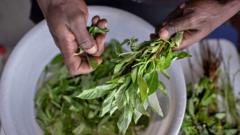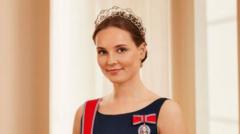The Norwegian tradition of partying on "russebuss" has sparked debate amid concerns about excessive drinking, peer pressure, and its influence on education. Parents and officials are pushing for reforms to move celebrations post-exams to ensure better focus on studies, while some school-leavers resist these changes fearing increased exclusion.
Norway’s Russe Celebration Faces Criticism Over Excessive Partying Culture

Norway’s Russe Celebration Faces Criticism Over Excessive Partying Culture
As Norwegian school-leavers embrace their final weeks of education with raucous celebrations, concerns grow regarding the impact of partying on exam performance and inclusivity.
In Norway, the weeks leading up to the national celebration on May 17, known as russe, are filled with revelry as school-leavers don colorful overalls and engage in a unique cultural tradition. Selma Jenvin-Steinsvag and her classmate Aksel, like many peers, hurriedly boarded the Oslo metro, ecstatic to finally shed the burden of exams after 13 years in school. However, the joyous tradition has recently drawn scrutiny as festivities begin earlier each year, raising concerns among parents and government officials about the long-term consequences on youth wellbeing and academic performance.
The russebuss, or party bus, has become a central element of the celebrations, often leading to nightly parties filled with loud music and heavy drinking. Participants like Edvard Aanestad express enthusiasm, describing it as a month of nonstop fun. Yet, many parents worry that the need to conform and partake excessively undermines their children’s academic focus during crucial exam weeks. Financial burdens also loom large, with some students accruing significant debt to cover the expensive cost of renting buses.
In recent discussions, Prime Minister Jonas Gahr Store has acknowledged the party bus culture's escalating nature, stating that it has "spun out of control.” Parents, such as Solveig Haukenes Aase, share similar sentiments, noting that the influence even extends to younger teenagers, originating from what was once considered a harmless rite of passage. Furthermore, school officials are recognizing that traditional views on the matter may need to evolve to better protect students.
Education Minister Kari Nessa Nordtun emphasized the detrimental impact of combined celebrations and academic responsibilities, noting that exam results have suffered as partying escalates. She, alongside other officials, proposes relocating celebrations to post-exam periods to alleviate stress, combat social exclusion, and prevent the pressures of high costs.
Historically, the party bus culture traces back to the early 1980s in Oslo but has since grown into a more elite yet nationwide phenomenon. Ivar Brandvol, an expert on the tradition, warns against the shift away from inclusive celebrations toward curated bus groups, which can exclude many students based on financial means.
As the government plans stricter measures, including banning certain bus designs to enhance safety, reactions from graduating students have varied. While some, like Edvard and his friend Henrik, view these changes as misplaced and potentially harmful to inclusivity, they have taken financing their participation into their own hands, sometimes working side jobs to fund their dreams.
Ultimately, the once-celebrated tradition of the russebuss may require significant reforms to ensure that the spirit of inclusion and fun survives in a way that prioritizes both safety and academic integrity for future school leavers in Norway.


















